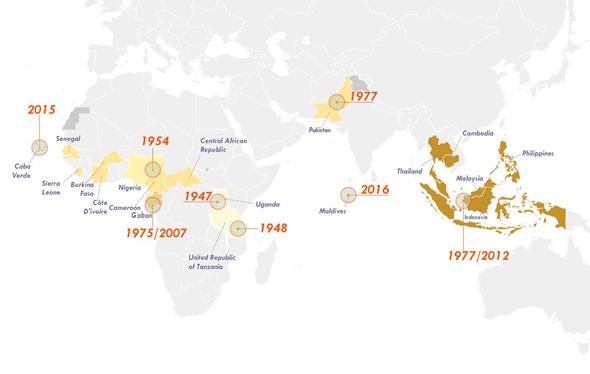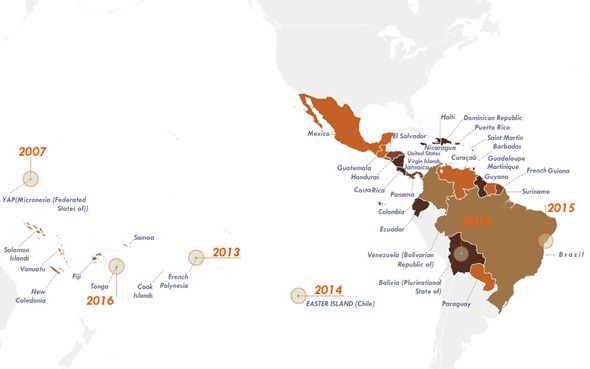The risk to adults and healthy individuals is still relatively small and certainly not life threatening or even highly infectious in the way past tropical diseases from Africa like Ebola have been.
The risk in terms of the Olympics, especially for travelling populations remains low – with the notable exception of pregnant women.

© lazyllama / Shutterstock.com
What are the main symptoms of Zika virus infection and why do many people not show any symptoms?
Its symptoms are comparable with the common cold: fever, joint pain, headaches, conjunctivitis (red eyes) and such.
Whilst in Brazil’s population there are some symptomless cases, people from abroad with no prior exposure to Zika virus (and therefore no resistance), would certainly have some symptoms.
This remains true for both North Americans and Europeans and so they are at no risk of further spreading the virus one-month after the return – should they not present any symptoms.
What precautions should Olympic and Paralympic games attendees take against the Zika virus?
The US-CDC
recommends that any travelers who are pregnant (at any stage/trimester) or are planning to become pregnant should avoid travelling to areas with Zika outbreaks.
If they cannot avoid travel, they should wear protective clothing, apply a U.S. Environmental Protection Agency (EPA)-approved insect repellent, and sleep in a screened room or under a mosquito net or in a room with air condition.

However, it is also important to note that the Aedes aegypti mosquitoes predominantly bite during the day,
especially around dawn and dusk, and therefore the correct timing and use of mosquito repellents and other personal protection measures are essential.
One final important point to make is that contraception for travellers during the Rio Olympics, and just as important, when they return home is another area of vigilance.

Countries and territories showing historical time-line of Zika virus spread (1947 - 2016)
Why is the Zika virus spreading rapidly now when huge outbreaks haven’t occurred before?
We will not be sure until we have analyzed and compare the virus’s RNA. It could have been the case that the virus has evolved, but at the same time it could also be because of the environmental conditions.
We must also look to the vectors of this disease – namely the Aedes aegypti mosquito. This particular type of Aedes mosquito is prominent throughout tropical regions – namely much of Latin America, South Asia, around the Gulf coast and isolated pockets near the Black Sea and Mediterranean sea in Europe, so its easier for the disease to spread in these areas.

Countries and territories showing historical time-line of Zika virus spread (1947 - 2016)
In terms of the virus and the region it has been found, most cases appear in Latin American mainland, The Caribbean and Cape Verde – it may however, be just a matter of time before it spreads into the Aedes aegypti’s other habitats in Africa and even Asia.
And, of course, its essential we continue to investigate how viable a vector other species of the Aedes mosquito may be as vectors, which could mean that the virus has a bigger reach if transmitted through the other Aedes species.

Countries and territories showing historical time-line of Zika virus spread (1947 - 2016)
Can the Zika virus cross the placenta? How much evidence is there of a link between zika, microcephaly and Guillain-Barré syndrome?
The Zika virus can certainly cross the placenta - this is how the fetus gets infected.
The link to microcephaly and GBS are becoming stronger now being supported by analysis of the antibody response with both acute antibodies (IgM) and long-term antibodies (IgG).
Is it currently known how long the Zika virus exists in people following infection?
If you were symptomless, then one-month (of condoms use) after your return will be enough to mitigate the risk of infection to a sexual partner, and six months after for those with symptoms.
Evidence suggests Zika may be able to survive in semen for up to one-month after infection – but there has also been some reports suggesting cases of Zika remaining in semen for several months. There may be other compartment, for instance in the eye, but we lack data to support this.
Are there any myths about Zika you’d like to dispel?
An awful lot has rightly been written about Zika in the last few months, yet still we see a number of misunderstandings, rumors and fear on the Virus’ potential risk propagating widely through the press.
Each day brings new developments and expert opinion on the subject, but also, more speculation and subterfuge. Advice varies from travels bans and mosquito repellents through to contraception and even abstaining from pregnancy.
A crucial factor amplifying this trend, and perhaps the elephant in the room, is the impending Rio games. With the world’s eye soon to be focused on Brazil there is clearly a demand from companies, governments and interested parties to ensure they safeguard their respective populations as best they can – but unfortunately, this is also means we have seen a number of them too hasty in their assessment of the risk. But the risk to adults and healthy individuals is still relatively small.
The controversial advice I have recently seen stems from the WHO itself – which suggested women in Latin America should not put off pregnancy for fear of Zika. The relation to microcephaly also raises the question of the ethics of not providing contraception to women who want it in the present situation.
However, until more information is known, and the RNA properly analyzed or a vaccine becomes available this is not a position I can yet support. We still need to fully understand the risks, and there is still a long way to go.

What advice would you give to athletes planning to attend the 2016 Olympic and Paralympic games in Rio de Janeiro?
Like I said, the risk in terms of the Olympics, remains low.
In one recent case, Kenya recently threatened to boycott the games entirely on safety grounds and this is clearly based on no identifiable scientific risk – as previously listed the risk for athletes alone remains very low and fundamentally manageable.
Where can readers find more information?
More information can be found on the CDC, ECDC, LSTM and WHO websites
About Prof. Eskild Petersen
Prof. Dr. Eskild Petersen is a member of the ESCMID study group for Infections in Travellers and Migrants (ESGITM) as well as a Professor of Tropical Medicine at Aarhus University Hospital, Denmark and Senior Consultant of Infectious Diseases, The Royal Hospital, Muscat, Oman.
He has undertaken work on infectious diseases, clinical immunology and tropical and travel medicine. His recent research focuses on the rapid spread of Zika virus in The Americas and the implications for the 2016 Brazil Olympic Games.